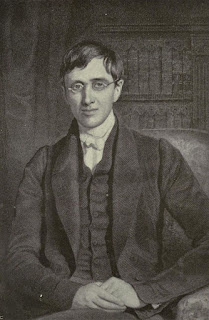The poem is number 49 in Newman's Verses on Various Occasions, composed on Christmas Day, December 25, 1832, while Newman was in Malta:
Christmas Without Christ
| HOW can I keep my Christmas feast |
| In its due festive show, |
| Reft of the sight of the High Priest |
| From whom its glories flow? |
I hear the tuneful bells around, |
| The blessèd towers I see; |
| A stranger on a foreign ground, |
| They peal a fast for me. |
O Britons! now so brave and high, |
| How will ye weep the day |
| When Christ in judgment passes by, |
| And calls the Bride away! {99} |
Your Christmas then will lose its mirth, |
| Your Easter lose its bloom: |
| Abroad, a scene of strife and dearth; |
| Within, a cheerless home! |
In December of 2020, Father Juan Velez provided some context to the poem on the Saint John Henry Newman website: |
St. John Henry Newman reminds us of the emptiness of Christmas without Christ. He titled some verses with these words on December 25, 1832, when he found himself quarantined in Malta, unable to attend the Christmas service.
Newman was quarantined and had a bad cold--and was on a very Catholic island. As The Malta Independent explains, he wouldn't have any Protestant, English church in which to pray or preach on Christmas Day, even if he could have left his hotel:
Reading the poem again later, I was reminded of Mary Katherine Tillman's essay on ""Realizing" the Classical Authors: Newman's Epic Journey in the Mediterranean" originally published in the Newman Studies Journal, 3:2 (Fall, 2006) but included in her 2015 volume of articles and essays, John Henry Newman: Man of Letters. I've been dipping in to this volume as I read Lead Kindly Light, the festschrift for the recently deceased Father Ian Ker.
She explains how Newman, as a reader of the Greek and Latin classics, had prepared for this great journey by bringing Thucydides's History of the Peloponnesian War, Homer, and Virgil--no guide books written for tourists--but books whose historical and literary highlights Newman experienced not just as a reader of the classics, but as a visitor to their sites, in a way never before. Tillman notes that Newman's letters were filled with poetic descriptions of these locations, Patras, Ithaca, Gibraltar, Mount Vesuvius, Virgil's tomb in Naples, Corfu, etc. He wrote 31 poems during the days of his journey, which were published as the "Lyra Apostolica" in the British Magazine. Tillman uses this greater appreciation of the classics as an example of how Newman uses the imagination to move from a notional apprehension of a subject to a real knowledge of it.
Even in the midst of that appreciation of the classics of ancient Greece and Rome, however, Newman was still thinking of religious matters, and thus his poems about Saint Paul, Moses, David and Jonathan, the Greek Fathers, and indeed, troubles in the Christian world, including in the Church of England.
In these last two days of Advent, I wish you a very Merry Christmas season.


No comments:
Post a Comment